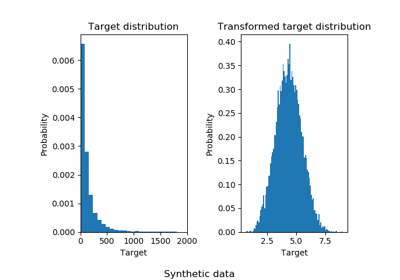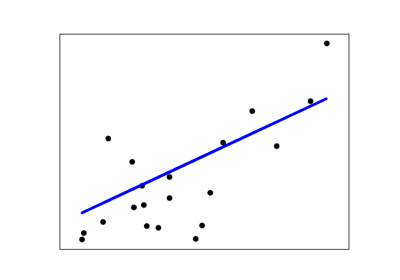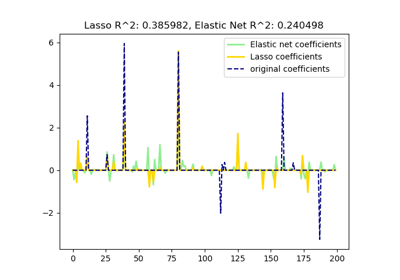sklearn.metrics.r2_score¶
-
sklearn.metrics.r2_score(y_true, y_pred, sample_weight=None, multioutput='uniform_average')[source]¶ R^2 (coefficient of determination) regression score function.
Best possible score is 1.0 and it can be negative (because the model can be arbitrarily worse). A constant model that always predicts the expected value of y, disregarding the input features, would get a R^2 score of 0.0.
Read more in the User Guide.
Parameters: - y_true : array-like of shape = (n_samples) or (n_samples, n_outputs)
Ground truth (correct) target values.
- y_pred : array-like of shape = (n_samples) or (n_samples, n_outputs)
Estimated target values.
- sample_weight : array-like of shape = (n_samples), optional
Sample weights.
- multioutput : string in [‘raw_values’, ‘uniform_average’, ‘variance_weighted’] or None or array-like of shape (n_outputs)
Defines aggregating of multiple output scores. Array-like value defines weights used to average scores. Default is “uniform_average”.
- ‘raw_values’ :
Returns a full set of scores in case of multioutput input.
- ‘uniform_average’ :
Scores of all outputs are averaged with uniform weight.
- ‘variance_weighted’ :
Scores of all outputs are averaged, weighted by the variances of each individual output.
Changed in version 0.19: Default value of multioutput is ‘uniform_average’.
Returns: - z : float or ndarray of floats
The R^2 score or ndarray of scores if ‘multioutput’ is ‘raw_values’.
Notes
This is not a symmetric function.
Unlike most other scores, R^2 score may be negative (it need not actually be the square of a quantity R).
References
[1] Wikipedia entry on the Coefficient of determination Examples
>>> from sklearn.metrics import r2_score >>> y_true = [3, -0.5, 2, 7] >>> y_pred = [2.5, 0.0, 2, 8] >>> r2_score(y_true, y_pred) 0.948... >>> y_true = [[0.5, 1], [-1, 1], [7, -6]] >>> y_pred = [[0, 2], [-1, 2], [8, -5]] >>> r2_score(y_true, y_pred, ... multioutput='variance_weighted') 0.938... >>> y_true = [1, 2, 3] >>> y_pred = [1, 2, 3] >>> r2_score(y_true, y_pred) 1.0 >>> y_true = [1, 2, 3] >>> y_pred = [2, 2, 2] >>> r2_score(y_true, y_pred) 0.0 >>> y_true = [1, 2, 3] >>> y_pred = [3, 2, 1] >>> r2_score(y_true, y_pred) -3.0




